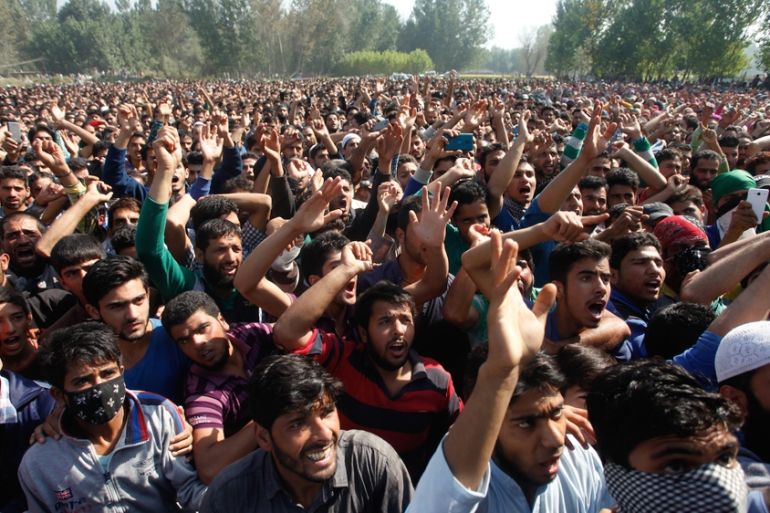Hundreds arrested in Kashmir ahead of Modi visit
Crackdown in India-administered Kashmir in bid to prevent ‘Million March’ called to protest weekend visit by Indian PM.

Authorities in India-administered Kashmir have cracked down on hundreds of political activists and pro-independence leaders ahead of Indian Prime Minister Narendra Modi’s visit to the region.
Modi will hold a public rally in the restive Himalayan territory on November 7 where rebels and pro-independence groups have called for a counter ‘Million March’ on the pattern of a similar campaign held recently in the US.
“India has responded to our peaceful march with sheer force. But we will try to reach the venue with one million people,” Syed Ali Shah Geelani, the region’s top pro-independence leader told Al Jazeera.
Geelani, who is under house-detention, has called for a such a march supported by all pro-independence parties and over a dozen rebel groups who are fighting for independence, or merger of the territory with Pakistan.
“We don’t want to sabotage his [Modi’s] rally but we want to remind the world about 18 UN resolutions on Kashmir that promise right of self-determination to Kashmiris,” he said.
Activists arrested
In the past few days, Indian police have raided several places across the region to detain political leaders and activists ahead of the visit.
Authorities have also blocked more than a dozen pages on social networking sites that were promoting the protest rally, while a complete blockade of internet, phones, roads and highways is expected on Saturday.
“We don’t want to take any chance. Known stone throwers and protesters have been detained while tight security measures are in place for the prime minister’s visit,” a top security official who wished to remain anonymous, told Al Jazeera.
Authorities fear the proposed march could cause a repetition of the huge anti-India rallies that rocked the region in 2008 and 2010 together, for months.
On Wednesday, Indian police raided a scheduled news conference of Hilal War, another pro-independence leader, before seizing him and his campaigners.
War’s People’s Political Party (PPP) has voiced support for the ‘Million March,’ saying: “Situations like these are in themselves a referendum to suggest what Kashmiris want.”
Members of another influential pro-independence party, the Jammu and Kashmir Liberation Front (JKLF), which is led by Yasin Malik, told Al Jazeera that police have detained “our 150 activists over their support of the ‘Million March’.”
“The top rung of our party is caged, while the mid-level and low-level activists have gone underground,” one of the party leaders told Al Jazeera from an undisclosed location over the phone.
‘Turning point’
Saturday’s trip marks Modi’s first visit to the Kashmir Valley since his right-wing Bharatiya Janata Party (BJP), and the local pro-India Peoples Democratic Party (PDP), assumed power in the 2014 local assembly polls.
The PDP leaders have billed his visit as a “turning point” in the history of Kashmir.
“Modi’s visit will offer fresh impetus to the ‘Agenda of Alliance’ between both parties which have political and economic aspects,” the PDP’s chief spokesperson, Mehboob Beg, told Al Jazeera.
The PDP expects the announcement of a financial package of $13.7bn for public infrastructure and for the victims of devastating floods last year, which caused an estimated $17bn of damage to homes and businesses.
“We are also looking forward to ending hostility with Pakistan with which we could have friendly ties,” Beg said, while recalling former Indian Prime Minister Atal Bihari Vajpayee’s visit to Kashmir in 2003, in which he offered to hold talks on all disputes with Pakistan.
Beg supported the government curb on pro-independence activists, saying: “Anything that disturbs the prime minister’s visit will not be allowed.”
India has stationed thousands of troops in Kashmir as part of a decades-old confrontation with Pakistan, which also claims the region.
Both the nuclear-armed Asian rivals have fought two of their three wars over the control of Kashmir since 1947, when the British left the sub-continent.
Nearly 100,000 people, mostly civilians, have been killed and thousands have disappeared during the armed revolt and subsequent military operations since 1989.